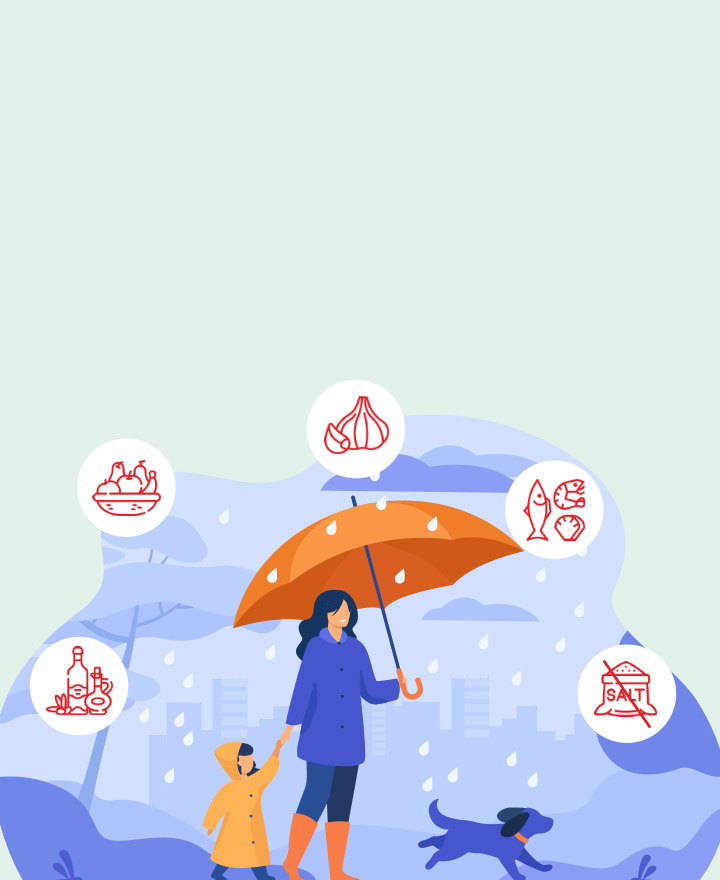

How to stay safe from monsoon diarrhoea?
During monsoon, waterborne diseases are the most common. Monsoon diarrhoea, is one such waterborne disease that commonly occurs during the monsoon season, often due to a combination of multiple factors associated with the weather and hygiene conditions prevalent during this time. Read on to learn about measures that can help you stay safe from this condition.
Tips to Help Prevent Monsoon Diarrhoea
To help prevent monsoon diarrhoea, consider following these tips:
1. Drink Safe Water:
Contaminated water and food are the primary causes of monsoon diarrhoea. Always consume boiled, filtered, or bottled water. Avoid drinking from open or potentially contaminated sources.
2. Practice Good Hygiene:
wash hands thoroughly with soap and clean water, especially before eating, after using the toilet, and after handling raw food.
3. Avoid Raw Foods:
Be cautious with raw fruits & vegetables unless they have been properly washed with clean water or peeled.
4. Ensure Food Safety:
Store food properly to prevent spoilage or contamination. Make sure the food is cooked thoroughly to kill harmful bacteria & viruses. Avoid eating uncooked or under-cooked food.
5. Maintain Proper Sanitation:
Ensure proper disposal of waste. Keep living areas clean and free from standing water where mosquitoes and other pathogens can breed. Use sanitary facilities that are well-maintained and free from contamination.
6. Stay Hydrated:
Drink plenty of water and fluids to stay hydrated. Ensure they are safe. Avoid excessive intake of sugary or caffeinated beverages.
7. Vaccinations:
Consider vaccinations for diseases that can cause diarrhoea, such as typhoid and cholera.
8. Monitor Health:
Be vigilant for early symptoms of diarrhoea and seek medical advice if needed.
Nutrition Guidelines To Follow
With the digestion system susceptible to health risks during monsoon, you must follow these tips to stay safe from monsoon diarrhoea —
• Avoiding fried and oily foods
• Avoiding eating sliced fruits kept in the open from street vendors
• Avoiding junk and processed foods rich in sugar
• Avoiding eating raw foods (especially seafood and green leafy vegetables)
• Eating light, warm, and freshly cooked meals at home
• Including lots of herbs and digestion-aiding elements like ginger and cumin in your daily diet
• Starting your day with healthy herbal beverages instead of tea or coffee
• Chewing your food properly
• Including a lot of probiotic-rich foods (like yoghurt) in your daily diet to aid digestion
• Eating a balanced diet every day with the right amount of proteins, fats, carbohydrates, vitamins, and minerals
FAQs
1. Is diarrhoea common during monsoon?
Yes, during monsoon, bacterial and viral infections can contaminate water sources. When you consume contaminated water/food, you can be diagnosed with monsoon diarrhoea. Also, during this season, digestive issues are on the rise. Hence, even a small infection can lead to diarrhoea.
2. Is monsoon diarrhoea a severe ailment?
In most cases, loose stools and abdominal pain will go away in 2-3 days when you take OTC medications and practice simple home remedies. However, if you notice watery stools, discharge of blood, and severe abdominal pain, you should seek medical help immediately to rule out severe complications later.
Conclusion
Monsoon diarrhoea is mostly caused by contaminated sources of water and food. Be mindful of the hygiene, freshness, and quality of your food and what you drink, and you can be safe from seasonal diarrhoea.
One of the important components of our overall wellness is also being financially secured. Healthcare emergencies can happen any time, but a good health insurance policy can protect you from such uncertain situations. To know more about Wellness and other health related tips, visit the wellness corner.
Source: apollo247.com, kent.co.in, lalpathlabs.com
Disclaimer: This blog provides general information and discussions about health and related subjects. The information and other content provided in this blog, website or in any linked materials are not intended and should not be considered, or used as a substitute for, medical advice, diagnosis or treatment. Kindly contact your Doctor before starting a new medicine or health regime.
Related Articles
Food Allergy Vs. Food Intolerance
Home remedies for healthy living
Published on September 9, 2024














 Health Insurance
Health Insurance  Travel Insurance
Travel Insurance  Car Insurance
Car Insurance  Cyber Insurance
Cyber Insurance  Critical Illness Insurance
Critical Illness Insurance
 Pet Insurance
Pet Insurance
 Bike/Two Wheeler Insurance
Bike/Two Wheeler Insurance  Home Insurance
Home Insurance  Third Party Vehicle Ins.
Third Party Vehicle Ins.  Tractor Insurance
Tractor Insurance  Goods Carrying Vehicle Ins.
Goods Carrying Vehicle Ins.  Passenger Carrying Vehicle Ins.
Passenger Carrying Vehicle Ins.  Compulsory Personal Accident Insurance
Compulsory Personal Accident Insurance  Travel Insurance
Travel Insurance  Rural
Rural